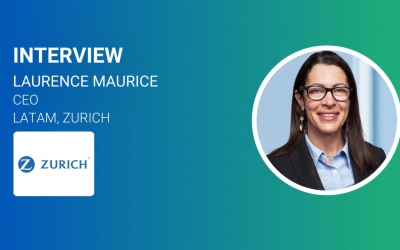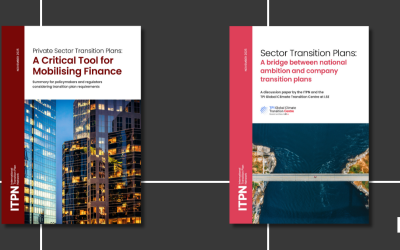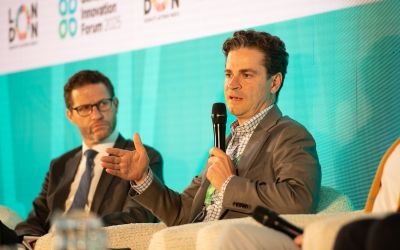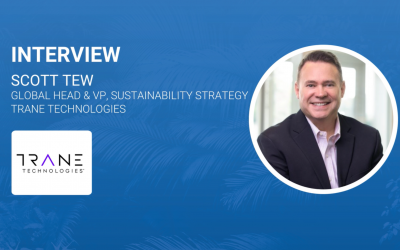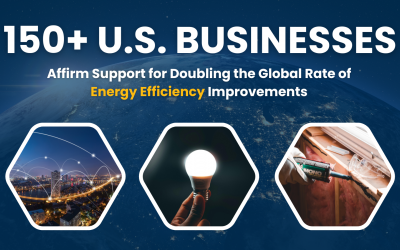Paul Marushka on the future of net zero reporting
After the Sustainable Innovation Forum 2021, Climate Action caught up with Paul Marushka, CEO & President at Sphera, to discuss the future of net zero reporting.

After the Sustainable Innovation Forum 2021, Climate Action caught up with Paul Marushka, CEO & President at Sphera, to discuss the future of net zero reporting.
Can you tell us how Sphera is working to accelerate the net zero transition?
Leading businesses are making net-zero pledges, but are struggling to determine how they will effectively track and measure their progress. Equally important, these organizations must understand the theoretical carbon impact of their current and future business decisions, and weigh that information when ultimately enacting change.
These organizations recognize that they must find a solution that is auditable, traceable, transparent measurable and accessible wherever work is being done. Through our suite of software, content and consulting services, Sphera enables businesses to focus more time on achieving targets and less time sourcing information. Sphera's software and consulting solutions helps accelerate decarbonization efforts by assessing an emissions baseline, addressing and solving the Scope 3 quantification challenge, and developing a robust carbon reduction strategy toward net-zero targets.
What is SaaS software? And how does Sphera utilise this to help organisations engage with sustainability?
Software as a Service (SaaS) is one part of cloud computing. In SaaS, users are able to access applications on mobile devices, etc., vs. traditional on-premise solutions. SaaS is an essential resource for any organization with an effective ESG strategy because it allows data to be accessible by large volumes of groups and teams to get the right information to the right people at the right time regardless where the user, which eliminates data silos. Large organizations with large footprints are only able to understand their existing footprint by collecting significant quantities of data across disparate systems, and Sphera makes this possible through its SaaS software.
However, SaaS is only one piece of the puzzle towards an effective ESG strategy. The most effective strategies must combine the data found in software and combine it with content and consulting services to have true visibility. Sphera brings all three of these pillars together to provide a comprehensive suite of services that enable businesses to facilitate the transformation necessary to accomplish net-zero targets.
What changes have you seen in ESG/Sustainability innovation over the past 30 years? What trends do you anticipate over the next 5-10 years?
For much of the previous 30 years, inaction was considered an acceptable business tactic, but we see each and every day what inaction has caused when it comes to combatting climate change. Beginning in the 2000s, consumer sentiment began to shift, so many organizations adopted strategies where minimal efforts were applied to appease society and governments. But words without action is nothing more than greenwashing when it comes to sustainability efforts.
As ESG has gotten more and more attention, more companies are finally realizing it’s time to make real change and move beyond strategies geared toward appeasing public perception through “fuzzy math” and lip service. Companies collectively collect quintillions of bytes of data each and every day, but are they able to provide the measurable data needed to make real change in their sustainability? Governments, investors, and customers alike want to know how sustainable companies are—and that means throughout their supply chains. In Sphera’s recent sustainability survey, a little over half (51%) of companies confirmed having sustainability commitments, but only 21% said they have a clear roadmap for implementing sustainability strategy into their core business. Businesses are now feeling immense pressure to enact change through net zero pledges, but are struggling to find the right solution to aid them on their ESG journey.
As we look to the future, the “S” and the “G” of ESG will absolutely become more prominent in the conversation, and organizations will be held to meeting social and governance standards in addition to environmental initiatives. The primary reason that the S and G lag behind the E is because there is a lack of data points to track that information today, but this is quickly changing. ESG is creating a fundamental shift that will transform the future of conducting business globally.
What advice would you give to any organisations wanting to integrate and understand climate risk better?
Every organization must recognize that ESG is not just a fad; the focus on ESG is here to stay. This is a fundamental shift that will affect every organization, and impact every business decision exponentially. Equally important, this shift will quickly transcend climate change and encompass social and governance sustainability. We are quickly entering an era where a cohesive ESG report will be just as important to investors as any financial metrics.
It is therefore imperative that organizations start developing a long-term plan, as it will determine not only which organizations will survive over the next decade but also whether we can meet the Paris Agreement objectives of staying below the 1.5˚C target. The only way to understand the climate impact of a business is to have a comprehensive suite of software, content and consulting services. Organizations around the world are using Sphera to understand their carbon footprint today, which helps them make smarter business decisions.
What is the future of net zero reporting and how does it affect broader ESG initiatives?
Businesses in the early stages of net-zero reporting are likely relying on a multitude of disparate solutions to collect their carbon data. They likely are relying on spreadsheets, and they are manually cobbling information together. External pressures (government, investors, customers, etc.) will continue to mount and force these businesses to fundamentally shift their ESG strategy to a scalable solution. This requires a comprehensive suite of software, content and consulting services.
The net-zero reporting is just the first step toward an effective and scalable ESG solution. Businesses will quickly expand beyond carbon and focus on water-quality implications and social and biodiversity implications. With our long-term relationship with the SBTi, Sphera can support organizations with expert help and advice in setting up a robust science-based net zero target.
As a society, we haven’t found an effective way to automate lifecycle ESG data yet, but it is coming. And when it arrives, the businesses that have developed an effective ESG strategy will be the ones that survive the coming decades.
Sphera are speaking at the Sustainable Innovation Forum 2021, to join them register here now.

